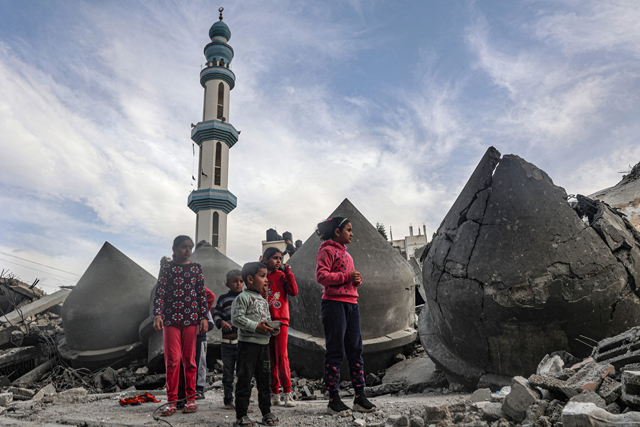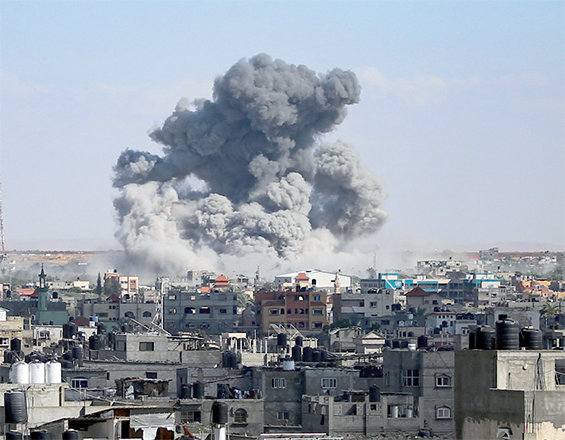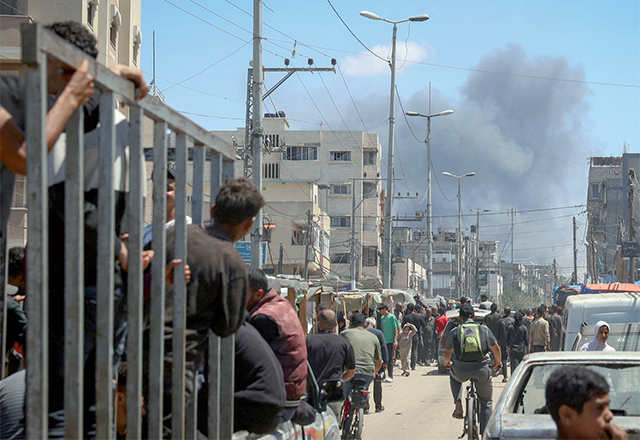You are here
Israeli PM vows to invade Gaza's Rafah despite world 'pressure'
By AFP - Mar 17,2024 - Last updated at Mar 17,2024

Children stand next to the rubble of Al Faruq Mosque, that was destroyed during Israeli bombardment, in Rafah on the southern Gaza Strip on Sunday (AFP photo)
GAZA STRIP, Palestinian Territories — Israeli prime minister Benjamin Netanyahu vowed on Sunday to send ground forces into Gaza's southern Rafah city despite growing international concern over the fate of Palestinian civilians sheltering there.
Netanyahu, whose security and war Cabinets were later due to discuss latest international efforts towards a truce deal, stressed that "no amount of international pressure will stop us from realising all the goals of the war".
"To do this, we will also operate in Rafah," he told a Cabinet meeting, hours before he was set to meet visiting German Chancellor Olaf Scholz for talks on the war raging since October 7.
Israel has repeatedly threatened to launch a ground offensive against Hamas fighters in Rafah, now home to nearly 1.5 million mostly displaced Gazans sheltering near the Egyptian border.
US President Joe Biden, whose country provides Israel with billions of dollars in military assistance, has said a Rafah invasion would be a "red line" without credible measures to protect civilians.
UN World Health Organisation chief Tedros Adhanom Ghebreyesus urged Israel "in the name of humanity" not to launch a Rafah assault, warning that "this humanitarian catastrophe must not be allowed to worsen".
Envoys were planning to meet in Qatar soon to revive stalled talks for a ceasefire and hostage release deal.
A Hamas proposal calls for an Israeli withdrawal from "all cities and populated areas" in Gaza during a six-week truce and for more humanitarian aid, according to an official from the Palestinian group.
Israel plans to attend the talks, with Cabinet members due to "decide on the mandate of the delegation in charge of the negotiations before its departure for Doha", Netanyahu's office said, without giving a date for when they would leave.
The war, meanwhile, raged on, and overnight Israeli bombardment across the Hamas-ruled territory killed at least 61 Palestinians, the Gaza health ministry said.
The dead included 12 members of the same family whose house was hit in Deir Al Balah, in central Gaza.
Palestinian girl Leen Thabit, retrieving a white dress from under the rubble of their flattened house, cried as she told AFP her cousin was killed in the strike.
“She’s dead. Only her dress is left,” Thabit said. “What do they want from us?”
Second aid ship
The war was triggered by Hamas’s October 7 sudden attack on southern Israel that resulted in about 1,160 deaths.
Israel’s retaliatory campaign against Hamas has killed at least 31,645 people in Gaza, most of them women and children, according to the health ministry.
Shelling and clashes were reported in south Gaza’s main city of Khan Yunis and elsewhere, and the Israeli army said its forces had killed “approximately 18 terrorists” in central Gaza since Saturday.
More than five months of war and an Israeli siege have led to dire humanitarian conditions in Gaza, where the UN has repeatedly warned of looming famine for the coastal territory’s 2.4 million people.
As the flow of aid trucks into Gaza has slowed, a second ship was due to depart from Cyprus along a new maritime corridor to bring food and relief goods, said officials of the island-nation.
On Saturday the US charity World Central Kitchen said its team had finished unloading supplies from a barge towed by Spanish aid vessel Open Arms which had pioneered the sea route.
Jordan on Sunday announced the latest aid airdrop over northern Gaza together with German, US and Egyptian aircraft.
The United Nations has reported particular difficulty in accessing the north, where residents say they have resorted to eating animal fodder, and where some have stormed the few aid trucks that have made it through.
Malnutrition and disease
Netanyahu has faced domestic pressure over the remaining captives, with protesters rallying in Tel Aviv on Saturday carrying banners urging a “hostage deal now”.
“The civilians... need to demand from their leaders to do the right thing,” said one demonstrator, Omer Keidar, 27.
In Rafah, the crisis has only grown worse, said medical staff at a clinic run by Palestinian volunteers that offers treatment for displaced Gazans.
“We’re facing shortages of medications,” said Dr Samar Gregea, herself displaced from Gaza City in the north.
“There are a lot of patients in the camp, with all children suffering from malnutrition” and a spike in hepatitis A cases, she told AFP.
“Children require foods high in sugars, like dates, which are currently unavailable.”
Related Articles
RAFAH, Palestinian Territories — Israel's military on Monday called for the evacuation of Palestinians from eastern Rafah ahead of a ground
RAFAH, Palestinian Territories — Israel sent tanks into Rafah in southern Gaza, seizing control of the border crossing with Egypt on Tuesday
GAZA CITY, Palestinian Territories — Israel continued with its attack on Gaza on Monday, including in far-southern Rafah, despite US warning

Opinion
Apr 09, 2025
Apr 08, 2025
- Popular
- Rated
- Commented
Apr 09, 2025
Newsletter
Get top stories and blog posts emailed to you each day.

















